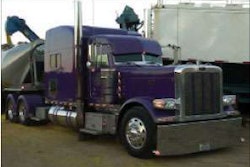The American Trucking Associations on Feb. 2 joined petroleum refiners and other end-users in a legal challenge to California’s recently enacted low-carbon fuel standard.
The regulation adopted by the California Air Resources Board requires annual reductions in the carbon intensity of gasoline and diesel over the next 10 years. The LCFS regulation falls directly upon fuel providers (refiners, importers and blenders of fuel), but is likely to impact end-users because of associated fuel price increases.
ATA says the legal challenge is based largely on the Commerce Clause with assertions that the “shuffling” of low-carbon fuel to California and away from other states will burden fuel providers and consumers significantly without any net change in fuel’s carbon intensity on a global scale, resulting in no reduction – and a likely increase – in greenhouse gas emissions.
“The LCFS would essentially ban imports to California of fuels derived from unconventional sources such as oil sands from Canada, oil shale from the Western U.S. or domestic coal supplies that can be converted into transportation fuels,” says Rich Moskowitz, ATA vice president. “Discouraging these fuels will simply increase costs while failing to prevent their export to and consumption by other nations.”

The complaint, filed in U.S. District Court in California, also challenged the regulatory scheme as discriminating in favor of California-produced fuels by assigning them lower carbon-intensity ratings because of shorter transportation distances to users. Others joining the suit include the Center for North American Energy Security, Consumer Energy Alliance and National Petrochemical and Refiners Association.








